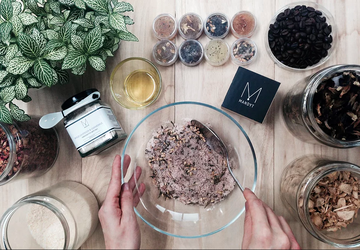Best Natural Skincare Routines For Different Skin Types
Have you ever wondered why your friend's miracle skincare product doesn't work for you? Have you ever felt frustrated with skincare routines that promise the world but deliver nothing? Your skin is unique, and so should your approach to caring for it.

Understanding Your Skin's Individual Needs
Skincare is a personal journey that goes beyond generic recommendations. Each person's skin tells a unique story of genetics, environmental factors, and lifestyle choices.
What works miraculously for one individual might cause complete disappointment for another. Recognizing the nuanced differences in skin types is the first critical step towards developing an effective, natural skincare routine that transforms and nourishes your skin.
Identifying Your Skin Type
Understanding your specific skin type requires careful observation and self-awareness. Skin types range from normal and balanced to dry, oily, combination, and sensitive, each with its characteristics and challenges.
Normal skin maintains a natural equilibrium, appearing neither greasy nor excessively dry. Dry skin often feels tight and may feature flaky patches. Oily skin, on the other hand, is typically shiny and is more prone to breakouts.
Combination skin presents a mix of different characteristics across various facial zones. Sensitive skin reacts quickly to environmental changes and skincare products, often showing signs of irritation or redness.
Natural Skincare Strategies For Each Skin Type
Natural skincare represents a holistic approach to skin health beyond surface-level treatment.
When you understand the unique needs of different skin types, you can develop a skin-specific strategy that addresses specific concerns while promoting overall skin wellness.
The secret to skincare success is selecting natural ingredients that work harmoniously with your skin's inherent characteristics, providing nourishment, protection, and balance.
Normal Skin: Maintaining The Balance
The goal for those blessed with normal skin is simple yet crucial: maintain and preserve your skin's natural equilibrium.
This skin type requires gentle, minimalistic care that supports its existing balance. Natural ingredients like aloe vera provide light hydration, while green tea extract offers protective antioxidants.
Lightweight botanical oils can help nourish the skin without disrupting its natural rhythm, ensuring your complexion remains healthy, vibrant, and resilient.
Dry Skin: Intense Hydration Techniques
Dry skin demands a more intensive approach to moisture restoration. Your skincare routine should deeply hydrate and repair the skin's protective barrier.
Natural ingredients become your best allies in this journey. Hyaluronic acid, sourced from natural origins, acts like a moisture magnet, attracting and retaining hydration.
Coconut oil provides rich, penetrating moisture, while shea butter creates a protective layer that prevents water loss.
Avocado oil delivers intense nourishment, helping to soften and smooth dry, rough skin textures.

Oily Skin: Balancing Without Stripping
Contrary to popular misconception, oily skin requires hydration and balance, not harsh elimination of natural oils.
The secret lies in using natural astringents and lightweight moisturizers that regulate oil production without causing additional stress. Witch hazel acts as a natural toner, helping to control excess sebum.
Tea tree oil provides antibacterial properties that combat potential breakouts. Niacinamide helps regulate oil production, while lightweight jojoba oil helps balance the skin's natural oil production.
Combination Skin: Targeted Care Approach
Combination skin presents a unique challenge, requiring a strategic, zone-specific approach. Different facial areas demand different care strategies.
Clay masks can effectively manage oily T-zones, absorb excess sebum, and minimize shine. Meanwhile, gentler, hydrating serums can nourish drier areas like cheeks and jawline. Flexibility and adaptability are critical to a successful skincare routine.
Sensitive Skin: Gentle and Soothing Solutions
Sensitive skin requires an exceptionally gentle, minimalist approach. You should prioritize soothing ingredients that minimize inflammation and support the skin's natural healing processes.
Chamomile offers remarkable calming properties, while calendula helps reduce redness and irritation. Oatmeal extracts provide natural anti-inflammatory benefits, and aloe vera delivers cooling, healing moisture.
Building Your Natural Skincare Routine
Creating an effective skincare routine is like composing a personalized symphony for your skin. Each step is crucial in maintaining skin health and promoting a radiant complexion.
A comprehensive routine typically involves cleansing, toning, treating, moisturizing, and protecting stages, each designed to support and enhance the skin's natural functions.
Your skincare routine extends far beyond topical products. Holistic skin health encompasses hydration, sleep quality, nutritional intake, and stress management.
Consuming antioxidant-rich foods, maintaining proper hydration, prioritizing restorative sleep, and reducing stress significantly improve skin wellness.
Your Skincare Transformation Starts Now
Don’t just read this article and go to bed. Consider this moment your turning point. Start by observing your skin.
Pay attention to how your skin responds to different environments, foods, and emotions. Your skin is constantly communicating with you—learn its language. Embrace patience and consistency. You must understand that natural skincare is a conversation, not a quick fix.
Some days will be better than others, and that's perfectly okay. Your skin, like you, is dynamic and ever-changing. What works today might need adjustment tomorrow, and that's the beauty of a personalized approach.
Frequently Asked Questions
Q1: How long before I see results from my natural skincare routine?
Ans: Most people notice improvements within 4-6 weeks of consistent application.
Q2: Can I mix different natural skincare products?
A: Regularly patch test and introduce new products to prevent adverse reactions.
Q3: Are natural products always better for sensitive skin?
Ans: Not necessarily. Some natural ingredients can still irritate. Always consult with a dermatologist.







